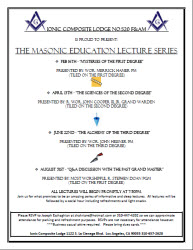How to Define Tolerance
How to Define Tolerance
Author: http://www.sandiegofreemason.com
To be tolerant is to learn to respect the opinions of others though they may diverge from ones own belief system.
The human family is diverse. The principles guiding value systems in each society are different. And while one may not agree with some aspect of another persons cultural interpretation of morality or justice, to be tolerant would require one to work at accepting and understanding it.
Thus tolerance is the acceptance of something an individual disagrees with. Hence tolerance is so highly regarded in Freemasonry for it is vital to its existence. Acceptance of others’ spiritual beliefs and traditions without being required to share them is the cornerstone of our fraternity.
Tolerance is the highest of masonic moral dictates. In one of the earliest speculative masonic texts (the Ahiman Rezon, or The Book of Constitutions of the Ancient Grand Lodge of England written in 1756 by Laurence Dermott) the first charge does not mention tolerance but defines it:
“…In antient Times, the Christian Masons were charged to comply with the Christian Usages of each Country where they travelled or worked; being found in all Nations, even of divers Religions.
They are generally charged to adhere to that Religion in which all Men agree (leaving each Brother to his own particular Opinion): that is, to be good Men and true, Men of Honour and Honesty, by whatever Names, Religions, or Persuasions they may be distinguished for they all agree in the three great Articles of Noah, enough to preserve the Cement of the Lodge.
Thus masonry is the Center of their Union, and the Happy Means of consiliating Persons that otherwise must have remained at a perpetual Distance.”
We are taught in Freemasonry to understand that each brother is different but equal.
We are also charged to, “Love your God with all of your heart, and all of your soul and all of your mind and all of your strength. And love your neighbor as yourself.”
In contemplating tolerance as an actuality one would logically adhere several attributes to achieving tolerant behavior. An ability to forgive others, sympathize with their peculiar circumstance, and the patience to reflect upon differences rather than react would seem mandatory to effecting a tolerant attitude.
If put into effect in everyday life, tolerance of others beliefs and respect for their equal right to believe something we may not agree with, will translate into a higher form of personal existence.
The spread of this practice among individuals of all cultures can only lead to a higher degree of mutual respect among nations and a more peaceful world.
To give this rationale crystal clarity one need only look at the antithesis of the idea of tolerance.
Who embraces intolerance?
Certain names spring to mind- Hitler, Stalin, Pol Pot and other infamous authoritarian figures of the 20th century come to mine. Ideologies also emerge- the Ku Klux Klan, Skin Heads, Nazis and Radical Islamic Militants.
An Austrian brother visited our lodge a couple of years ago and presented the master with a pin. The pin had the representation of a forget-me-not flower on it.
The brother explained that it was symbolic of Austrian Freemasonry for he said the first thing Hitler did to consolidate his power was detain and murder prominent Freemasons in Germany and Austria.
Hitler could not allow Freemasonry to exist because the Nazi philosophy was entirely based on the inequality of human species and intolerance of those races deemed inferior.
Thus the forget-me-not is a symbol of remembrance on the pin. It is to remind us of the danger of allowing intolerance into our own lives and society as well as the need to regularly incorporate tolerance into our hearts and minds.
By Steve Laurvick …
